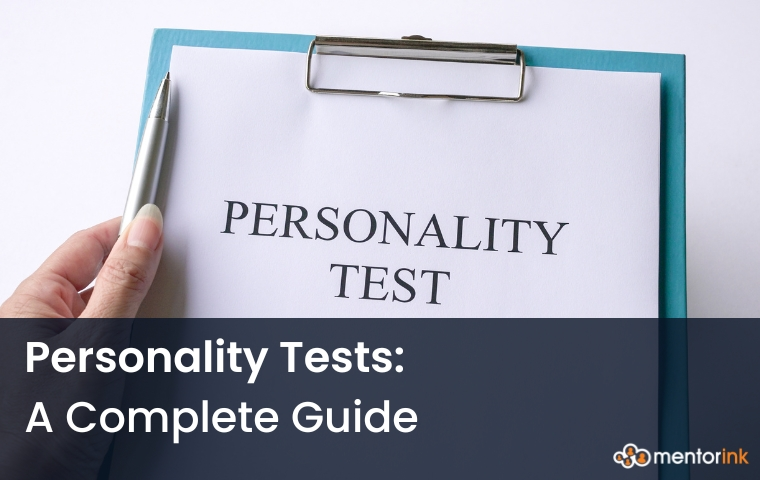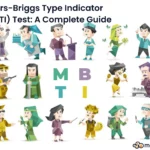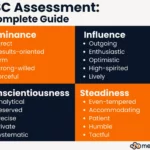
Humankind has been interested in understanding human personality for centuries. Understanding a person’s personality can help you better understand how they think, behave, and interact with others in a variety of contexts. among the most widely used methods for evaluating and classifying these characteristics is the personality test. Personality tests offer a methodical approach to understanding the complicated nature of human behavior, whether it is for team-building, self-discovery, or hiring decisions.
What Is a Personality Test?
One psychological instrument used for evaluating and classifying a person’s behaviors, actions, and characteristics is a personality test. These evaluations are intended to find patterns in individual perspectives, decision-making processes, and interpersonal interactions. In professional life, the use of personality tests has increased significantly.
According to the latest research results, personality tests have great importance. “Each year, some 100 million workers worldwide take psychometric tests, meaning tests designed to study personality and aptitude.”
Individuals usually respond to a series of assertions or inquiries on personality tests according to their feelings or preferences. The findings are then examined to bring the spotlight on a number of personality traits, including emotional stability, openness to new experiences, and introversion versus extroversion.
Numerous settings, such as education, therapy, hiring, and personal growth, use personality testing. Some tests evaluate interpersonal skills, leadership style, or compatibility, while others concentrate on discovering strengths and talents. These assessments are now essential resources for both professional and personal growth since they offer a methodical framework for comprehending personality.
What is Personality?
The distinct set of qualities, features, and behaviors that characterize an individual’s relationships with the outside world is known as their personality. It influences our thoughts, emotions, and actions in various contexts. While experiences, surroundings, and cultural background create some parts of personality, others are innate and genetically driven.
Personality is defined by psychologists as a collection of recurring patterns that are steady throughout time. For instance, although an introverted person might prefer solitary pursuits or one-on-one chats, an extrovert is likely to actively seek out social contacts and flourish in group environments.
Personality can be categorized into several dimensions, such as openness, conscientiousness, agreeableness, extraversion, and neuroticism. These dimensions influence how we process information, handle stress, and interact with others. Understanding personality helps individuals gain self-awareness and navigate relationships more effectively. It also provides organizations with a deeper understanding of how employees might perform, collaborate, and contribute to team dynamics.
What are the Main Five Types of Personality Tests?
The curiosity to know the personality of the individual in the last century has paved the way for the emergence of personality tests applied with many different methods. Among the most popular and widely used tests are the MBTI, Gallup CliftonStrengths, DISC Assessment, Insights Discovery Test and the Big Five Personality Test.
Myers-Briggs Type Indicator (MBTI)
The MBTI is one of the most well-known personality tests in the world. This famous personality test was invented by Katharine Cook Briggs and Isabel Briggs Myers. The main aim of this test is to categorize individuals into 16 personality types based on four dichotomies.
•Introversion (I) vs. Extraversion (E): How people gain energy, whether through solitude or social interaction.
•Sensing (S) vs. Intuition (N): How individuals perceive and process information, either through facts or abstract ideas.
•Thinking (T) vs. Feeling (F): How decisions are made, either logically or based on emotions.
•Judging (J) vs. Perceiving (P): How people approach life, either through structure or spontaneity.
MBTI personality test can be used by various companies. If you want to get more information about MBTI Test, you can look at our blog content about “
Gallup CliftonStrengths
Instead of classifying a person’s general personality, Gallup’s CliftonStrengths test concentrates on determining individuals’ distinct strengths. This test mainly assesses 34 talent themes, including convincing, relationship-building, and strategic thinking, to show what people are naturally good at.
As it enables leaders and employees to take advantage of their talents to enhance performance and efficiency, this test is very well liked in organizational settings. CliftonStrengths promotes a good, strengths-based corporate culture by reorienting the attention from flaws to skills.
DISC Assessment
The DISC personality test has been used since 1928. It is a well-known personality test that categorizes human behavior into four categories.
•Dominance (D): Focused, results-driven, and confident.
•Influence (I): Social, enthusiastic, and persuasive.
•Steadiness (S): Reliable, patient, and cooperative.
•Conscientiousness (C): Analytical, detail-oriented, and systematic.
Like before, today the DISC assessment is widely used in the workplace to improve communication among team members.
Insights Personality Test
The Insights Discovery Personality Test can be defined as a psychometric tool. The purpose of the tool is to assist individuals in understanding their behavioral tendencies, communication styles, and, naturally, core personality traits. The test is rooted in Carl Jung’s psychological theory of types, and it focuses on four key personality dimensions.
- Introversion & Extroversion
- Thinking & Feeling
- Sensing & Intuition
- Judging & Perceiving
Big Five Personality Test
The Big Five Personality Test, also known as the Five-Factor Model (FFM), measures five core personality dimensions.
•Openness: Creativity and willingness to try new things.
•Conscientiousness: Organization, discipline, and goal orientation.
•Extraversion: Sociability, energy, and assertiveness.
•Agreeableness: Compassion, kindness, and cooperation.
•Neuroticism: Emotional stability and resilience.
One of the personality assessments with the greatest scientific validation is the Big Five. The results are applied in a variety of contexts, such as personal growth, recruitment, and psychological study.
Can Personality Tests Predict Job Performance?
Although they are not perfect predictors, personality tests can offer insightful information about a person’s likely performance on the job. Responsibility is one personality attribute that has been repeatedly associated with improved job performance in a variety of roles. For instance, diligent people are more likely to accomplish their goals, adhere to protocols, and fulfill deadlines.
However, the particular profession and the qualities being evaluated determine how predictive personality tests are. For example, extraverted and influential people may be preferred for sales positions, whereas openness and conscientiousness may be advantageous for analytical positions.
It is crucial to remember that personality tests should serve as a component of a more comprehensive evaluation procedure. A broader understanding of a candidate’s fit for a position can be obtained by combining personality testing with skills evaluations, interviews, and job simulations.
Are Personality Tests Accurate and Reliable?
Depending on the personality test being utilized and the situation, personality tests can vary in accuracy and dependability. Extensive research supports the reliability of tests such as the Big Five Personality Test.
One problem with personality tests is the possibility of social desirability bias, in which people answer questions not honestly but rather in a way they believe will be viewed favorably. This may have an impact on how accurate the results are, especially in situations with high stakes, like job interviews.
The assessment’s implementation and interpretation have an impact on reliability as well. The test’s validity can be increased with competent result analysis, pleasant testing conditions, and clear instructions. Besides, a personality test’s credibility should be thoroughly assessed by organizations prior to its use in decision-making procedures.
How Personality Test Results Help Organizations?
Organizations can benefit from personality testing in a number of ways, including better hiring decisions, stronger collaboration among team members, and leadership development.
Personality Tests Give Clues For Hiring
Employers can find candidates whose qualities fit the job criteria and corporate culture by integrating personality tests into the hiring process. For instance, a collaborative person also might do better in team-oriented settings, but a highly analytical candidate might be more suited for a data-driven position.
Building Stronger Teams
Personality tests also help managers understand the strengths, weaknesses, and communication styles of their team members. This knowledge can be used to assign roles in the workplace, resolve conflicts, and create balanced teams with complementary skills and traits.
Improving Employee Development
Organizations can also concentrate on employee development by identifying individual abilities and growth areas using personality tests such as the Gallup CliftonStrengths. Employee productivity and happiness can be improved with modified development plans based on personality insights.
Supporting Leadership Development
For leaders, personality tests provide insights into their own management style and how it impacts their team. Understanding traits like dominance, influence, or conscientiousness can help leaders adapt their approach to different situations and team members.


